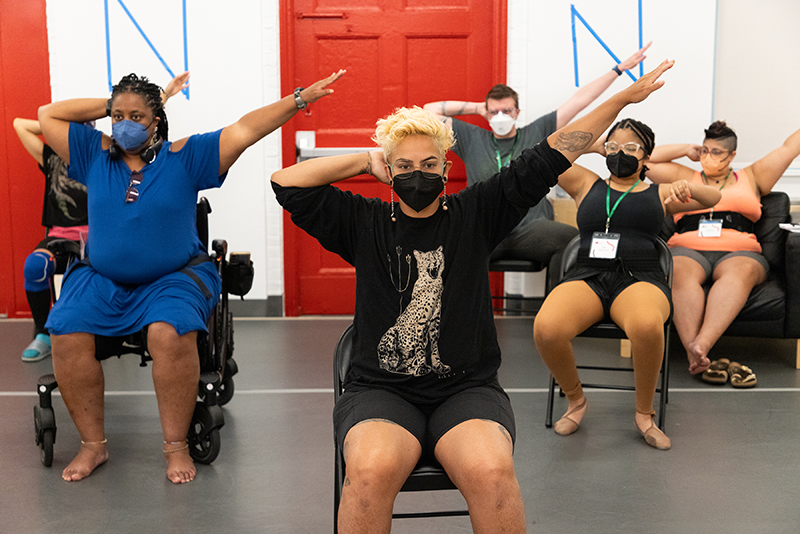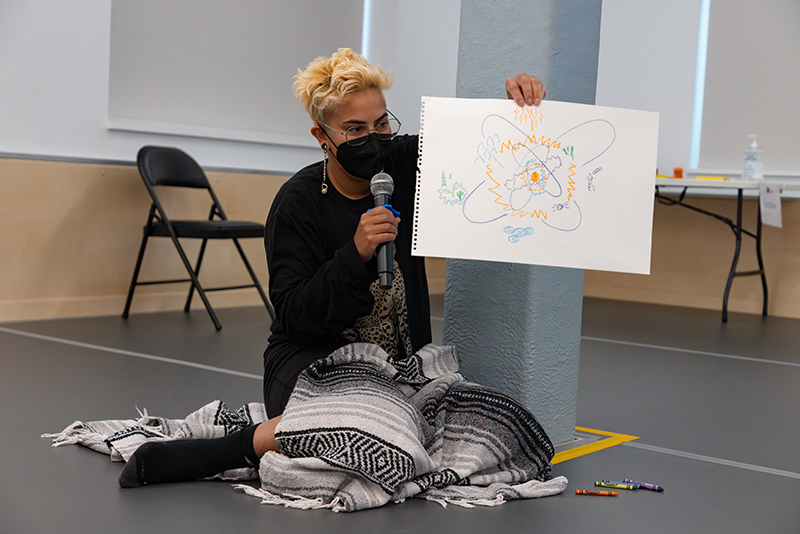Possibility Modeled
August 28, 2025
An Interview with How We Move cohort artist kumari giles
BY EMMALY WIEDERHOLT; PHOTOS BY WHITNEY BROWNE
kumari giles is a multidisciplinary artist, connector, administrator, and consultant based in Tkaronto (Toronto, Canada). They were a 2025 cohort artist of How We Move, a program for multiply marginalized disabled artists to move together, collaborate, and build cross-disability community. Here, kumari shares how they appreciated and learned from the collective care modeled by How We Move, how spaces like How We Move relieve isolation for multiply marginalized artists, and how they are now better able to articulate their artistic practice.
This interview is part of a series on How We Move.

~~
How did you get into dance and what shaped you as an artist?
As a dance artist I’m really interested in breaking open everything that we know and understand dance to be. I want to create art and spaces where people can be moved deeply. This is shaped and guided by disability justice, decolonial practice, and rad two spirit, queer and trans radicalized folks in my communities locally and beyond. I stopped dancing in 2010, due to body policing and experiences of racism, homophobia, and transphobia. The same year I saw, ILL NANA/DiverseCity Dance Company and was changed by the blending of forms, the queer and trans racialized fabulosity! A year later I joined the collective and started to be in community with more and more folks who were exploring decolonial art making, advocacy, and performance. Now, I am largely shaped by my dynamic disability and brain injury in how it’s opened what I perceive of the world – the forest, mycelial threads, the loud sounds of a city, the buzzing of a bee. I am also shaped by my love of science, my grandmother’s cooking hands, trying to find hope, transformative justice, abolition, and my garden. I am so deeply indebted to the wisdoms our communities carry and so deeply motivated to find pathways for us to move towards our collective liberation.
What was your experience of How We Move?
My experience was filled with lots of grief and joy all at the same time. I will be reflecting and sense-making the experience for a good long while! I learned a lot about myself and what it means to be in a collective space. I really enjoyed having one-on-one conversations with folks when possible – the moments to more deeply learn about each other were so meaningful to me. I was so struck by the COVID protocol which meant that I could be present in person. And so grateful for the level of care/access in general that was tended to in the process – which isn’t a specific moment but a series of small things with big impact.
Why are programs like How We Move important?
It is so rare that there are spaces for BIPOC disabled folks to come together and even rarer when we are in person. A moment to connect and relieve some of the isolation that I/we feel daily cannot even be captured in words/gestures/images. I was so excited that this program existed for the sheer impact it would have on our communities as a possibility model to know that we can gather and resource ourselves in this way.
Will your experience of How We Move impact your artistic practice going forward? If so, how?
I have a better sense of how to articulate my artistic practice, my goals, and what I’m dreaming of to others. This will impact how I’m able to share about my work with others within dance contexts and uplift the kind of work I do and the importance of it. I also have a much clearer understanding of what access needs and frictions exist for me in gathering spaces.
What’s next for you? Do you have an upcoming project or focus you’d like to share more about?
I most often have to create the spaces that I want/can work in and so I would love to be invited into projects where I can be a creative collaborator without also producing/administrating! In the next year, I’m working on an exciting theatre project, a cross-disability social dance ball and piloting a network of disabled BIPOC movers in so-called Canada. In the next five years, I’ll be remounting FIRE, a multidisciplinary work by ILL NANA/DiverseCity Dance Company about our lives as QTBIPOC while increasing capacity towards performance and touring where disabled people are onstage, backstage, and producing!
And I want more rest, I want that for all of us.

~~
To learn more about How We Move, visit www.embracedbody.com/hwm.
